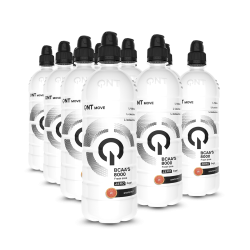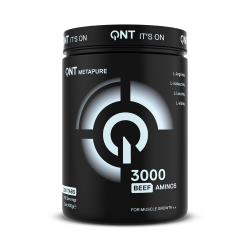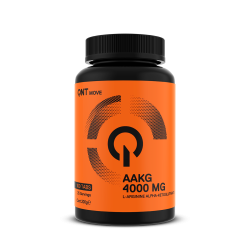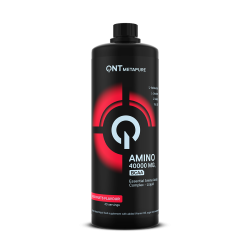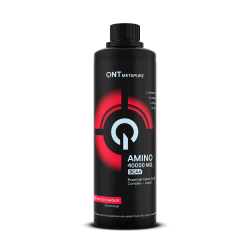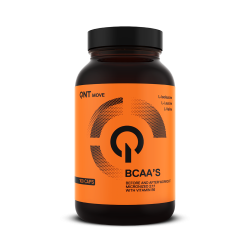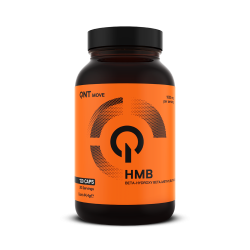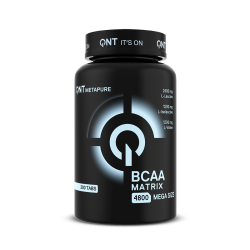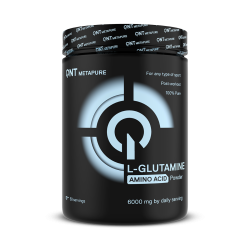BCAA & AMINO ACIDS
Amino acids are classified based on their ability to be synthesized by the body or not. Non-essential amino acids are synthesized by the body, unlike essential amino acids. The latter can be obtained through supplementation. Their rapid assimilation helps provide energy to the body, supports muscle maintenance and growth, enhances immune system function, and promotes quicker recovery. Amino acids are the ideal supplements to help you achieve your goals.
There are 12 products.
WHAT ARE AMINO ACIDS?
Amino acids are the building blocks of proteins, playing a fundamental role in nearly all biological processes. They are involved in tissue construction and repair, enzyme and hormone production, as well as supporting the immune system. Additionally, they are essential for energy production and regulation of metabolic processes.
What is an Amino Acid?
An amino acid is an organic molecule composed of an amine group (-NH2), a carboxyl group (-COOH), and a unique side chain for each amino acid. Amino acids link together to form proteins through peptide bonds, creating polypeptide chains that fold into specific three-dimensional structures.
Importance of Amino Acids
Amino acids are crucial for many bodily functions:
- Construction and Repair of Tissues: Amino acids are necessary for muscle protein synthesis, promoting muscle growth and repair.
- Production of Enzymes and Hormones: Enzymes, which catalyze chemical reactions in the body, and hormones, which regulate various physiological processes, are composed of amino acids.
- Support of the Immune System: Certain amino acids, like glutamine, are essential for proper immune cell function.
- Energy Production: Amino acids can be used as a source of energy by the body, especially during times of stress or intense exercise.
- Regulation of Metabolic Processes: Amino acids play a role in regulating the metabolism of proteins, carbohydrates, and lipids.
In summary, amino acids are essential for overall health and well-being. A balanced diet rich in high-quality proteins is crucial to ensure an adequate intake of essential amino acids. For athletes and those with increased needs, dietary supplements can be an effective option to optimize performance and recovery.
ROLE OF AMINO ACIDS IN SPORTS
Amino acids are essential nutrients for athletes and active individuals, playing a crucial role in athletic performance and recovery. Their influence extends across several aspects of training and competition, from muscle protein synthesis to energy management and fatigue.
Muscle Protein Synthesis
Amino acids, especially Branched-Chain Amino Acids (BCAAs) like leucine, isoleucine, and valine, are crucial for muscle protein synthesis. Leucine, in particular, is known to stimulate protein synthesis and promote muscle hypertrophy. This activation is essential for building and repairing muscle tissues, especially after intense training sessions.
Tissue Regeneration
Intensive training results in micro-tears in muscle fibers, requiring regeneration to strengthen muscles. Amino acids provide the building blocks necessary for this repair process. Glutamine, for example, plays a key role in tissue regeneration and immune system support, which is critical for athletes undergoing rigorous training.
Energy Production
Amino acids can be metabolized to produce energy, particularly during periods of physical stress or glycogen deficiency. During prolonged workouts, the body can use BCAAs as an alternative energy source, delaying muscle fatigue and improving endurance. Isoleucine, for example, helps regulate blood sugar levels and provides energy to muscles during exertion.
Reduction of Fatigue
Amino acids also contribute to reducing both mental and physical fatigue. Tryptophan, a precursor to serotonin, can influence serotonin levels in the brain, thus regulating mood and perception of fatigue. BCAAs can also help decrease serotonin production during exercise, delaying the onset of central fatigue (mental) and improving overall concentration and performance.
Enhancement of Concentration
Mental focus is crucial for athletes, especially in sports requiring precision or complex strategies. Amino acids, by participating in neurotransmitter synthesis, can improve mood, vigilance, and concentration. This is particularly beneficial in sports where mental clarity and quick decision-making are essential.
Optimization of Recovery
After exercise, recovery is a critical phase for athletes. Amino acids accelerate this process by reducing inflammation and facilitating repair of damaged muscle tissues. Taking amino acid supplements post-workout can reduce muscle soreness and enable quicker recovery from training sessions, maximizing performance gains and reducing the risk of injury.
Amino acids are powerful allies for athletes, offering a multitude of benefits from muscle protein synthesis to fatigue reduction and enhanced concentration. Incorporating amino acids into one's diet, whether through food or supplements, is essential to optimize athletic performance and promote rapid, effective recovery. For athletes looking to maximize their potential, amino acids are an indispensable element of their nutritional strategy.
WHEN TO TAKE AMINO ACIDS?
The timing of amino acid consumption is crucial to maximize their beneficial effects on athletic performance, energy, catabolism prevention, and muscle recovery. Here's how amino acids can be effectively integrated before, during, and after training.
Before or During Training
Objectives: Provide energy, prevent catabolism, improve performance.
1. Provide Energy:
- Amino acids, especially BCAAs, can be used as an alternative energy source when glycogen stores are low. During prolonged exercise, muscles consume BCAAs to maintain energy levels, thereby delaying muscle fatigue.
- Taking BCAAs before or during training helps stabilize energy levels and improve endurance, especially during long and intensive sessions.
2. Prevent Catabolism:
- Catabolism is the process of breaking down muscle tissues to provide energy, particularly when glycogen stores are depleted. This can limit muscle gains and prolong recovery.
- BCAAs, especially leucine, play a key role in preventing catabolism by promoting protein synthesis and reducing muscle breakdown. This helps preserve muscle mass during training.
3. Enhance Performance:
- By maintaining high energy levels and preventing muscle breakdown, amino acids enable athletes to perform at optimal levels throughout their session. They also contribute to mental focus and alertness, which is crucial for sports requiring high precision and coordination.
After Training.
Objectives: Aid in muscle repair, promote muscle growth.
1. Aid in Muscle Repair:
- After intense exercise, muscles undergo micro-tears that require repair to become stronger and larger. Amino acids provide the necessary building blocks for this repair.
- Glutamine, for example, is crucial for muscle tissue regeneration and supporting the immune system after intense exercise.
2. Promote Muscle Growth:
- Taking amino acids after training stimulates muscle protein synthesis, a vital process for muscle hypertrophy (muscle growth).
- Leucine is particularly effective in activating signaling pathways (such as mTOR) that regulate protein synthesis. This accelerates muscle growth and optimizes gains achieved through training.
3. Reduce Muscle Soreness and Inflammation:
- Amino acids, such as BCAAs, can reduce delayed-onset muscle soreness by decreasing inflammation and speeding up tissue repair. This allows athletes to return to training faster with less pain and discomfort.
Integrating amino acids into your routine before, during, and after training can significantly enhance your performance and recovery. Before and during exercise, they provide energy, prevent muscle breakdown, and enhance overall performance. After training, they aid in muscle tissue repair and promote muscle growth while reducing inflammation and soreness. By optimizing the timing of amino acid intake, you can maximize your gains and achieve your athletic goals more effectively.
OUR DIFFERENT AMINO ACIDS.
Amino acids play a crucial role in sports performance and recovery. We offer a comprehensive range of amino acids, each with specific benefits to optimize your results. Here's a detailed overview of our key amino acids:
1. BCAA (Branched Chain Amino Acids).
BCAAs, or Branched Chain Amino Acids, are composed of three essential amino acids: leucine, isoleucine, and valine. These amino acids represent about 30% of the total amino acids present in muscles and are particularly important for athletes due to their numerous benefits.
- L-leucine: This amino acid is crucial for muscle building and repair of damaged tissues. Leucine activates the mTOR pathway, which stimulates muscle protein synthesis, thereby promoting muscle hypertrophy.
- L-isoleucine: It provides energy to muscles, helping to maintain and develop muscle mass. Isoleucine also plays a role in regulating blood sugar levels, which can improve endurance and reduce fatigue.
- L-valine: This amino acid contributes to protein synthesis and muscle recovery. Valine helps prevent muscle breakdown during exercise, which is essential for preserving muscle mass.
BCAAs are particularly useful before, during, and after training to improve performance, reduce fatigue, and promote recovery.
2. L-Glutamine.
L-Glutamine is a non-essential amino acid but highly abundant in the body. It plays a key role in post-training recovery by supporting tissue regeneration and preventing muscle catabolism.
- Rapid Recovery: L-Glutamine promotes fast recovery after intense training by aiding in the repair of damaged muscle tissues.
- Catabolism Prevention: During physical stress, such as during and after exercise, glutamine levels can decrease, leading to muscle breakdown. Supplementing with L-Glutamine helps maintain adequate levels, thus preventing catabolism.
- Glycogen Formation: L-Glutamine assists in glycogen formation and storage, crucial for providing energy during exercise and replenishing energy stores after training.
Usage: L-Glutamine is ideal after training to maximize recovery and prevent energy loss, but it can also be taken during training to prevent muscle breakdown.
3. L-Arginine.
L-Arginine is a non-essential amino acid that plays an important role in nitric oxide production, a molecule that enhances blood circulation and promotes muscle anabolism.
- Growth Hormone Production: L-Arginine stimulates growth hormone production, resulting in beneficial anabolic effects for muscle growth.
- Improved Blood Circulation: By increasing nitric oxide production, L-Arginine improves blood circulation, allowing better nutrient and oxygen transport to muscles. This enhances endurance and performance.
- Creatine Synthesis: L-Arginine is also a precursor to creatine, a molecule that helps provide rapid energy to muscles during high-intensity workouts.
Usage: L-Arginine is perfect for intense strength training sessions as it enhances recovery, increases muscle mass, and allows optimal training performance.
Amino acids are essential nutrients for athletes, offering specific benefits for performance, recovery, and muscle growth. Whether to increase your energy, prevent muscle breakdown, or enhance recovery, our different amino acids can help you achieve your athletic goals. Incorporate them into your training routine to maximize your performance and optimize your results.
LEARN MORE:
Discover the benefits of BCAAs: boost your sports performance and recovery!
Isoleucine: everything you need to know to optimize your health.
